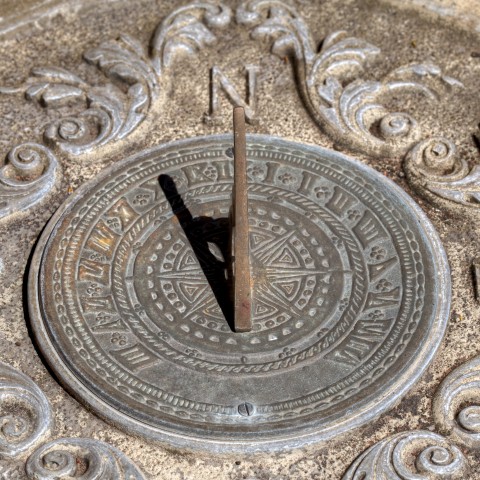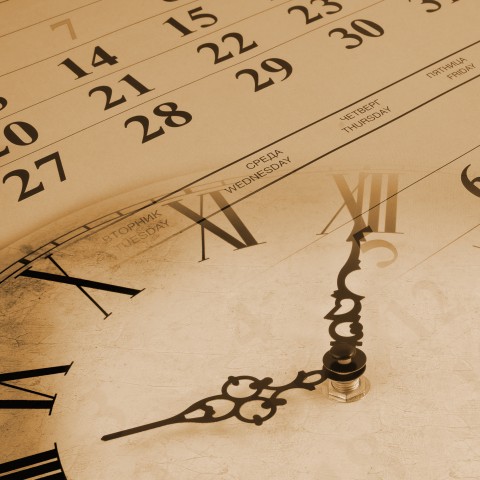
Time is such an indispensable element of our life. So, if you’re planning to stay in India for a while, learning about time in Hindi and being able to say Hindi phrases such “at what time” will undoubtedly keep you ahead in life.However, living in India gives you breathing space in that regard, and a delay of a few minutes isn’t something to worry about! In other words, India is more of an easy-going place when it comes to being present right on time. Nonetheless, to many, punctuality is just another way of showing respect to others.
 Table of Contents
Table of Contents
- Importance of Time in Hindi Language-Learning
- Learn Hindi Time
- General Time Reference of the Day
- Learn How to Tell Time in Hindi
- Asking for the Time in Hindi
- Time Adverbs
- Time Proverbs and Sayings
- Get Ahead of Time with HindiPod101.com
1. Importance of Time in Hindi Language-Learning

As we all know, doing things on time brings success in professional life and fulfillment in personal life. Apparently, from tending to the most mundane tasks of daily life to being present for the more significant events, the role of time can’t be underestimated. Hence, it’s essential for you to learn how to tell time in Hindi and become familiar with a variety of Hindi time expressions.
Thus we’ve brought you a complete guide in telling time in Hindi. This guide will teach you how to tell time in Hindi, how to ask “What time is it?” in Hindi, and even about the time zone in India.
Before you dive into this excellent read on telling the time in the Hindi language, we strongly recommend that you follow these engaging learning strategies to get the most out of this article!
2. Learn Hindi Time

Speaking of the mundane activities in our daily routines—such as waking up on time, catching a flight, going to a movie with friends, or rushing to that important interview—in India, nothing can be done properly if you don’t know how to tell time in Hindi or, further, talk about the time in Hindi.
1- Meaning of Time in Hindi
Let’s begin with the first step and learn how to say “time” in India. The two most common words that native speakers use for “time” are समय (Samay) and वक़्त (vaqT).
For example:
- समय पर सो जाना।
Samay par So jaaNaa.
“Go to bed on time.”
- दवा लेने का वक़्त हो गया है।
Davaa LeNe kaa vaqT ho gayaa hai.
“It’s time for your medicine.”
2- A.M. and P.M. in Hindi
You must have heard of the Latin terms “a.m.” and “p.m.” A.M. stands for “Ante Meridiem” and P.M. stands for “Post Meridiem,” but do you know that Indians also like to use a different set of words for “a.m.” and “p.m.” in Hindi?
Well, a.m. in Hindi is known as पूर्वाह्न (puurvaahN).
And p.m. in Hindi is known as अपराह्न (apraahN).
3- Time Zones in Hindi
Quite often when people from two different time zones talk to each other online or over the phone, they keep asking “What time is it there?”
When comparing times in two distinct parts of the world, the concept of time zones is the greatest tool for preventing any confusion!

Different Time Zones in the World
In order to learn Hindi time in its entirety, it’s certainly important to know how to talk about time zones in Hindi!
“Time zone” in Hindi is known as समय क्षेत्र (Samay kseTr).
- भारत के समय क्षेत्र को भारतीय मानक समय के नाम से जाना जाता है।
bhaaraT ke Samay kseTr ko bhaarTiiy maaNak Samay ke Naam Se jaaNaa jaaTaa hai.
“The time zone in India is known as Indian Standard Time (IST).”
Date and time in Hindi go hand-in-hand. While in the sections below, we’ll keenly discuss and learn Hindi time expressions, you can also check out our comprehensive lesson on How to Read Dates as well.
3. General Time Reference of the Day
Telling the time in Hindi would be so boring if all we did was use digits. Moreover, if you really wish to learn how to tell time in Hindi, using these general time references will make telling time in Hindi like a native speaker a dream come true!In the table below, we’ve hand-picked for you the best time expressions in Hindi.
| Hindi Phrases | English Meaning | Usage in a Sentence |
|---|---|---|
| सुबह तड़के (Subah Tadake) | “Early morning” | क्या तुम सुबह तड़के सैर पर चलोगी ? (kyaa Tum Subah Tadake Sair par caLogii?) “Would you like to go for a walk early in the morning?” |
| सुबह (Subah) | “Morning” | सुबह जल्दी उठना स्वास्थ्य के लिए लाभदायक होता है। (Subah jaLDii uthaNaa SvaaSTHy ke Liye LaabhaDaayak hoTaa hai.) “Getting up early in the morning is good for health.” |
| सूर्योदय (SuryoDay) | “Sunrise” | कल सूर्योदय का समय 4 बजे का है। (kaL SuuryoDay kaa Samay caar baje kaa hai.) “The sunrise time for tomorrow is four a.m.” |
| सूर्यास्त (SuryaaST) | “Sunset” | सूर्यास्त के बाद फल नहीं खाना चाहिए। (SuuryaaST ke baaD phaL nahiin khaaNaa caahiye.) “Fruits should be avoided after sunset.” |
| दोपहर (Dopahar) | “Afternoon” | हम सब दोपहर में पिकनिक पर चलेंगे। (ham Sab Dopahar men piksNik par caLenge.) “We will all go to the picnic in the afternoon.” |
| शाम (saam) | “Evening” | मुझे शाम में चाय पीना पसंद है। (mujhe saam men caay piiNaa paSanD hai.) “I like to have tea in the evening.” |
| रात (raaT) | “Night” | कल रात मूवी देखने में बहुत मज़ा आया। (kaL raaT muuvii DekhaNe men bahuT mazaa aayaa.) “It was a lot of fun watching the movie last night.” |
| दिन (DiN) | “Day” | आज का दिन काफ़ी थकान भरा था। (aaj kaa DiN kaafii THakaaN bharaa THaa.) “It was a tiring day today.” |
| गोधूलि (goDHuuLi) | “Twilight” | गोधूलि बेला में पंछी अपने घरों को लौटने लगते हैं। (goDHuuLi beLaa men paNchii apaNe gharon ko LautaNe LagaTe hain.) “At twilight, birds start returning to their homes.” |
| आधी रात (aaDHii raaT) | “Midnight” | हम आधी रात तक हवाई अड्डे पर ही थे। (ham aaDHii raaT Tak havaaii adde par hii THe.) “We were at the airport until midnight.” |
By now, you must understand that just like in English, telling the time in Hindi doesn’t necessarily mean mentioning the clock hours. The phrases listed above are also frequently used by natives to give just a general reference to the time of the day.
What phrase / sentence would you use to describe your day in Hindi?
4. Learn How to Tell Time in Hindi

Reading the Date and Time in Hindi
We’ve finally arrived at the most significant and practical part of this article. Telling time in Hindi isn’t possible without learning the units of time in Hindi.
In this segment, you’ll learn how to say hours in Hindi, minutes in Hindi, and seconds in Hindi. You’ll also find out the meaning of “o’clock” in Hindi.
1- Hour
“Hour” in Hindi is known as घंटा (ghantaa). The plural form, “hours,” can be translated as घंटे (ghante).
Moreover, for the term “o’clock,” the common Hindi word is बजे (baje).
One important thing to remember is that in Hindi, “hours” and “o’clock” are not interchangeable. They actually mean two different things.
Let’s learn the difference with the help of some example sentences.
- ट्रेन चार घंटे देर से आएगी।
treN caar ghante Der Se aayegii.
“The train is four hours late.”
- ट्रेन चार बजे आएगी।
treN caar baje aayegii.
“The train will arrive at four o’clock.”
As you can see, the word घंटे (ghante), or “hours,” stands for the duration; the word बजे (baje), or “o’clock,” refers to the time on the clock.
2- The Twelve-Hour Clock
The twelve-hour clock is more common in India than the twenty-four-hour clock. Once you get the drift of it, you’ll realize how easy it is to answer or ask “What time is it?” in Hindi.
| Time in English | Time in Hindi | Time in Hindi |
|---|---|---|
| 1 o’clock | एक बजे (ek baje) | एक बजे हैं। (ek baje hain.) “It’s 1 o’clock.” |
| 2 o’clock | दो बजे (Do baje) | दो बजे हैं। (Do baje hain.) “It’s 2 o’clock.” |
| 3 o’clock | तीन बजे (TiiN baje) | तीन बजे हैं। (TiiN baje hain.) “It’s 3 o’clock.” |
| 4 o’clock | चार बजे (caar baje) | चार बजे हैं। (caar baje hain.) “It’s 4 o’clock.” |
| 5 o’clock | पाँच बजे (paanc baje) | पाँच बजे हैं। (paanc baje hain.) “It’s 5 o’clock.” |
| 6 o’clock | छह बजे (chah baje) | छह बजे हैं। (chah baje hain.) “It’s 6 o’clock.” |
| 7 o’clock | सात बजे (SaaT baje) | सात बजे हैं। (SaaT baje hain.) “It’s 7 o’clock.” |
| 8 o’clock | आठ बजे (aath baje) | आठ बजे हैं। (aath baje hain.) “It’s 8 o’clock.” |
| 9 o’clock | नौ बजे (Nau baje) | नौ बजे हैं। (Nau baje hain.) “It’s 9 o’clock.” |
| 10 o’clock | दस बजे (DaS baje) | दस बजे हैं। (DaS baje hain.) “It’s 10 o’clock.” |
| 11 o’clock | ग्यारह बजे (gyaarah baje) | ग्यारह बजे हैं। (gyaarah baje hain.) “It’s 11 o’clock.” |
| 12 o’clock | बारह बजे (baarah baje) | बारह बजे हैं। (baarah baje hain.) “It’s 12 o’clock.” |
Adding to that, Indians don’t typically use terms like a.m. and p.m. all the time. So, to avoid all the confusion, the hours are usually described depending on the phase of the day.
For instance:
- 4 p.m. would be expressed as शाम के चार बजे (saam ke caar baje).
- 7 a.m. would be expressed as सुबह के सात बजे (Subah ke SaaT baje).
- 2 p.m. would be expressed as दोपहर के दो बजे (Dopahar ke Do baje).

3- Minutes and Seconds
The above examples were just about the hours. So how can you give the exact time in Hindi using both hours and minutes?
- “Minute” in Hindi is pronounced as मिनट (miNat).
- “Second” in Hindi is pronounced as सेकेंड (Sekend).
We can better understand these concepts with the help of a simple example.
When someone says to you “Tell me the time in Hindi,” how do you respond?
Suppose the current time is 3:18. In Hindi, it would simply be said as 3 बज के 18 मिनट (TiiN bajakar/bajake athaarah miNat).
1. If the time is in the first half of the hour, the rule is:
(hour) + बजकर (bajakar) + (minutes) + मिनट हुए हैं (miNat huye hain).
For example:
- तीन बज कर अठारह मिनट हुए हैं।
TiiN bajakar athaarah miNat huye hain.
“It is 3:18.”
2. If the time is in the second half of the hour, the rule is:
(the coming hour) + बजने में (bajaNe men) + (minutes remaining until the next hour) + हैं (hain).
For example:
- चार बजने में दो मिनट हैं।
caar bajaNe men Do miNat hain.
“It is 3:58.”
Does Hindi counting confuse you? Worry not! We also have a blog article on Hindi numbers; time in Hindi really can’t be studied without going through and understanding this important subject!
So, why don’t you check out our lesson on Hindi numbers and flaunt your Hindi counting knowledge in the comment box? Let’s see if you can tell us what 5 o’clock in Hindi is!
4- Hours Divided into Minutes
| Hours and Minutes | English | Hindi | Usage in a Sentence |
|---|---|---|---|
| 1:30* | “Half past one” | डेढ़ (dedh) | विद्यालय की छुट्टी डेढ़ बजे होती है। (viDyaaLay kii chuttii dedh baje hoTii hai.) “The school closes at half past one.” |
| 2:30** | “Half past two” | ढाई (dhaaii) | हम लोग ढाई बजे शॉपिंग के लिए चलेंगे। (ham Log dhaaii baje sauping ke Liye caLenge.) “We will go shopping at half past two.” |
| –:15 | “Quarter past” | सवा (Savaa) | फ़्लाइट सवा चार बजे की है। (fLaait Savaa caar baje kii hai.) “The flight is at a quarter past four.” |
| –:30 | “Half past” | साढ़े (Saadhe) | सुधा सुबह साढ़े छह बजे उठ जाती है। (SuDHaa Subah Saadhe chah baje uth jaaTii hai.) “Sudha gets up at half past six in the morning.” |
| –:45 | “Quarter to” | पौने (pauNe) | मैच पौने बारह पर शुरू होगा। (maic pauNe baarah par suru hogaa.) “The match will begin at a quarter to twelve.” |
As you can see in the table above, there are exceptions for saying the 1:30 and 2:30 time in Hindi.
* डेढ़ (dedh) is used for “1:30.”
** ढाई (dhaaii) is used for “2:30.”
For the rest of the hours and minutes, the pattern is uniform. For instance, 11:45 in Hindi is known as पौने बारह (pauNe baarah).
We hope you’re enjoying our lesson on how to tell the time in the Hindi language.
Allow us to introduce you to these powerful memory-enhancing strategies to help you learn how to tell time in Hindi effectively.
5. Asking for the Time in Hindi
When setting up the time for a plan, it’s pretty common for us to ask each other “at what time.” Translate in Hindi and it becomes कितने बजे (kiTaNe baje).
Needless to say, it’s one of the most frequently used phrases when talking about time.

Do you want to amaze native speakers with your command over Hindi? Of course you do. So, here’s a tip for you! Practice these common phrases used to ask for time.
For instance, the “What time is it there?” meaning in Hindi would be:
- वहाँ पर कितने बज रहे हैं ? Or वहाँ पर क्या वक़्त हो रहा है ?
(vahaan par kiTaNe baj rahe hain?) or (vahaan par kyaa vaqT ho rahaa hai?)
Both of these sentences qualify as “What time is it there?” in Hindi.
- कितने बजे हैं ?
kiTaNe baje hain?
“What’s the time?”
- टाइम क्या हो रहा है ?
taaim kyaa ho rahaa hai?
“What time is it?”
- कितना समय हुआ ?
kiTaNaa Samay huaa?
“What’s the time?”
- मूवी / मीटिंग कितने बजे की है ?
muuvii / miiting kiTaNe baje kii hai?
“What time is the movie/meeting?”
- क्या आप बता सकते हैं समय कितना हुआ है ?
kyaa aap baTaa SakaTe hain Samay kiTaNaa huaa hai?
“Do you have the time please?”
In short, if you want to ask “What time is it?”, say कितने बजे हैं ? (kiTaNe baje hain), and if you wish to ask “at what time,” translate in Hindi as कितने बजे (kiTaNe baje) and you’ll be good to go!
6. Time Adverbs
Once you learn how to tell time in Hindi, there’s absolutely no stopping you! In fact, you’ll enjoy it so much and wonder why you didn’t learn this all sooner.
Let’s look at some time adverbs that Hindi speakers use quite frequently in their day-to-day lives, and practice using them in sentences.
1- Right now
अभी तुरंत (abhii TuranT)
- मैं अभी तुरंत आपको पैसे वापस करता हूँ।
main abhii TuranT aapako paiSe vaapaS karaTaa huun.
“I will return you the money right now.”
फ़ौरन (fauraN)
- इन्हें फ़ौरन अस्पताल ले चलो।
inhen fauraN aSpaTaaL Le caLo.
“Take her to the hospital right now.”
2- Currently
अभी (abhii)
- मैं अभी जर्मनी में रह रही हूँ।
main abhii jarmaNii men rah rahii huun.
“Currently, I’m in Germany.”
इस समय (iS Samay)
- इस समय शिमला में बर्फ़बारी हो रही है।
iS Samay simaLaa men barfabaarii ho rahii hai.
“Currently, there’s a snowfall happening in Shimla.”
3- Meanwhile
इस दौरान (iS DauraaN)
- इस दौरान, बिल्ली गेंद से खेल रही थी।
iS DauraaN, biLLii genD Se kheL rahii THii.
“Meanwhile, the cat was playing with the ball.”
4- Before
पहले (pahaLe)
- खाने से पहले हाथ धोने चाहिए।
khaaNe Se pahaLe haaTH DHoNe caahiye.
“You should wash your hands before eating.”
5- After
बाद में (baaD men)
- ऋतु अपना काम ख़त्म करने के बाद सोयेगी।
riTu apaNaa kaam khaTm karaNe ke baaD Soyegii.
“Ritu will sleep after finishing her work.”
6- Soon
जल्द ही (jaLD hii)
- हम जल्द ही मिलेंगे।
ham jaLD hii miLenge.
“We will meet soon.”

7- Almost
लगभग (Lagabhag)
- खाना लगभग तैयार हो चुका है।
khaaNaa Lagabhag Taiyaar ho cukaa hai.
“The food is almost ready.”
8- In a little while
कुछ ही देर में (kuch hii Der men)
- कुछ ही देर में मूवी शुरू होने वाली है।
kuch hii Der men muuvii suru hoNe vaaLii hai.
“The movie will begin in a little while.”
थोड़ी देर में (THodii Der men)
- मैं थोड़ी देर में वापस आ जाऊंगी।
main THodii Der men vaapaS aa jaauungii.
“I will be back in a little while.”
9- For a long time
कई दिनों तक (kaii DiNon Tak)
- पुस्तकालय कई दिनों तक बंद रहेगा।
puSTakaaLay kaii DiNon Tak banD rahegaa.
“The library will remain closed for a long time.”
लंबे समय तक (Lambe Samay Tak)
- राजेश लंबे समय तक जापान में था।
raajes Lambe Samay Tak jaapaaN men THaa.
“Rajesh was in Japan for a long time.”
एक अरसे तक (Ek araSe Tak)
- एक अरसे तक सीमा भारत नहीं आ पायी।
ek araSe Tak Siimaa bhaaraT Nahiin aa paayii.
“Seema couldn’t come to India for a long time.”
10- Anytime
कभी भी (kabhii bhii)
- तुम मेरे घर कभी भी आ सकते हो।
Tum mere ghar kabhii bhii aa SakaTe ho.
“You can come to my house anytime.”
किसी भी वक़्त (kiSii bhii vaqT)
- बारिश किसी भी वक़्त हो सकती है।
baaris kiSii bhii vaqT ho SakTii hai.
“It may start raining anytime now.”
11- As soon as possible
जितनी जल्दी हो सके (jiTaNii jaLDii ho Sake)
- जितनी जल्दी हो सके वापस आ जाओ।
jiTaNii jaLDii ho Sake vaapaS aa jaao.
“Come back as soon as possible.”
जल्द से जल्द (jaLD Se jaLD)
- मुझे जल्द से जल्द ये किताब ख़त्म करनी है।
mujhe jaLD se jaLD ye kiTaab khaTm karaNii hai.
“I have to finish this book as soon as possible.”
12- Just now
अभी – अभी (abhii – abhii)
- मुझे अभी – अभी यह ख़बर मिली है।
mujhe abhii abhii yah khabar miLii hai.
“I heard the news just now.”
7. Time Proverbs and Sayings
Hindi is a rich language. Knowing Hindi helps you taste the depth and diverse range of so many Hindi proverbs and sayings related to time.

So, here’s our bonus section with the most popular proverbs and quotes on time in Hindi.
- समय ही सबसे बड़ा धन है।
Samay hii SabaSe badaa DHaN hai.
“Time is money.”
- समय किसी के लिए नहीं रुकता।
Samay kiSii ke Liye nahiin rukaTaa.
“Time waits for none.”
- समय बहुत बलवान है।
Samay bahuT baLavaaN hai.
“Time is powerful.”
- गुज़रा वक़्त कभी वापस नहीं आता।
guzaraa vaqT kabhii vaapaS Nahiin aaTaa.
“Once the time has passed, it never comes back.”
- समय हर घाव भर देता है।
Samay har ghaav bhar DeTaa hai.
“Time heals every wound.”
What’s your favorite time-related proverb? Try translating it in Hindi and share it with us in the comment box!
8. Get Ahead of Time with HindiPod101.com

Whoa! This certainly has been quite a comprehensive lesson, but wasn’t it totally worth it? By now, you should have a much better idea of how to ask and give the time in Hindi. Why not practice giving the current time in Hindi where you are by dropping us a comment?
HindiPod101.com makes learning such a fun thing that learners just can’t get enough of it. So why wait, when all these amazing free Hindi resources are waiting to be explored?
If you haven’t signed up yet, join our platform by clicking here and get instant access to the best Hindi lessons. You can also explore the top 100 Hindi words and try out our Hindi-English online dictionary for free!For more information, don’t hesitate to visit our “MyTeacher” section. Have a happy Hindi learning time!










